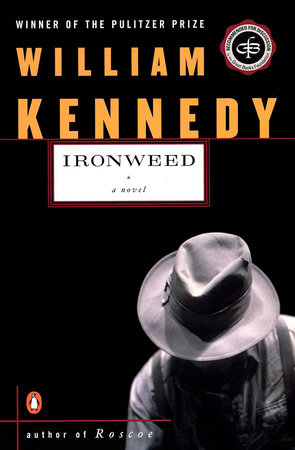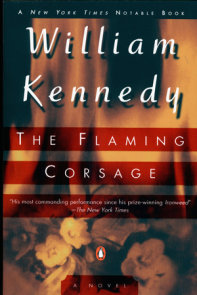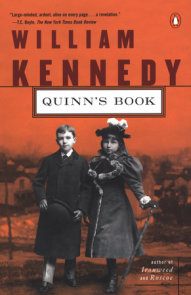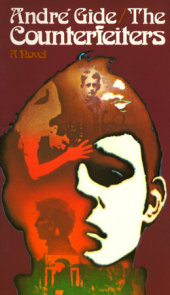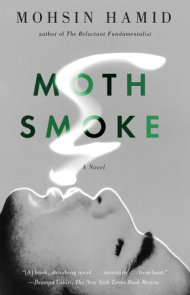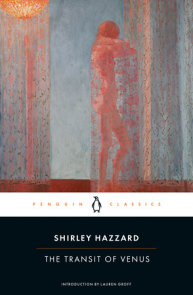READERS GUIDE
Questions and Topics for Discussion
INTRODUCTION
Ironweed is an unusual novel which William Kennedy found difficult to get published. Although his three previous novels had been highly praised, eleven major publishing companies rejected Ironweed. The Viking Press finally agreed to publishIronweed in 1983 along with Kennedy’s two previous novels, which are, like Ironweed, set in Albany, New York. Not only were the reviews enthusiastic, but the novel was awarded the coveted Pulitzer Prize and then the National Book Critics Circle Award in 1984. Like James Joyce’s novels which made a literary legend of the streets of Dublin, Ireland, William Kennedy’s novels have brought unprecedented attention to Albany, New York, for they immortalize the life of that capital city in the 1930’s. Kennedy has also produced a collection of tales and remembrances in O Albany! that celebrates Albany’s colorful past and Kennedy’s Irish-American boyhood.
But Ironweed is only secondarily a novel about Albany. It is primarily a novel about survival – about an ordinary man, a bum by his own admission, whose extraordinarily bad luck has brought him to rock bottom but also to the discovery, within himself, of an inner strength that he cannot understand.
NOTE TO THE TEACHER
The questions, exercises, and assignments on these pages are designed to guide students’ reading of the literary work and to provide suggestions for exploring the implications of the story through discussions, research, and writing. Most of the items can be handled individually, but small group and whole class discussions will enhance comprehension. The Response Journal should provide students with a means, first, for recording their ideas, feelings, and concerns, and then for reflecting these thoughts in their writing assignments and class discussions. These sheets may be duplicated, but teachers should select and modify items according to the needs and abilities of their students.
ABOUT WILLIAM KENNEDY
William Kennedy, author, screenwriter and playwright, was born and raised in Albany, New York. Kennedy brought his native city to literary life in many of his works. The Albany cycle, includes Legs, Billy Phelan’s Greatest Game, and the Pulitzer Prize winning Ironweed. The versatile Kennedy wrote the screenplay for Ironweed, the play Grand View, and cowrote the screenplay for the The Cotton Club with Francis Ford Coppola. Kennedy also wrote the nonfiction O Albany! and Riding the Yellow Trolley Car. Some of the other works he is known for include Roscoe and Very Old Bones.
Kennedy is a professor in the English department at the State University of New York at Albany. He is the founding director of the New York State Writers Institute and, in 1993, was elected to the American Academy of Arts and Letters. He has received numerous literary awards, including the Literary Lions Award from the New York Public Library, a National Endowment for the Arts Fellowship, and a Governor’s Arts Award. Kennedy was also named Commander of the Order of Arts and Letters in France and a member of the board of directors of the New York State Council for the Humanities.
DISCUSSION QUESTIONS
PREPARING TO READ
- Before the novel begins, there is a description of the flower named Ironweed. Knowing that this flower is wild and that it has a characteristically tough stem, what can you anticipate about the qualities of the main character of the novel?
- The story takes place in Albany in 1938. Review what was going on in the world at that time. What were living conditions like for most people?
- As you read the novel, stop occasionally to record your thoughts, reactions, and concerns in a Response Journal. Your journal may be a separate notebook, or it may be individual sheets which you clip together and keep in a folder. Include statements about the characters – what you learn about them, how they affect you – and about the key issues and events which the book explores. Also, jot down questions you have about events or statements in the book which you do not understand. Your Response Journal will come in handy when you discuss the novel in class, write a paper, or explore a related topic that interests you. Because this novel contains a number of sophisticated words (e.g., erubescent and contumacious), you may want to keep a list of some of those words and their meanings in your journal.
UNDERSTANDING THE STORY
Chapter I
- What does the setting of the opening scene suggest about the rest of the novel?
- What do you learn about Francis? About the dead people, especially Francis’s mother and father? About Gerald?
- What kind of power does Gerald have? What obligations does Gerald impose on his father? Why?
Chapter II
- What time of year is this? What does the author suggest by saying that “the old and the new dead walk abroad in this land” (p. 129)?
- Of what significance are trolleys to Francis? What is Francis’s connection with Harold Allen?
- How does Francis usually spend his evenings and nights? What do you learn about the people he associates with?
- What is important about Sandra’s life? What do you expect will become of her?
- Of what importance is Helen in Francis’s life? What qualities does she possess?
Chapter III
- What is Helen’s philosophy about dying? How does Sandra’s death support that philosophy?
- Of what importance is Francis’s encounter with Rowdy Dick Doolan? In what different ways has Francis run away?
- How does Francis relate to Jack and Clara? What are their feelings about Francis?
- Why do Francis and Helen separate? How does Francis suppose Helen will spend the night? What does Francis decide about his life?
Chapter IV
- What do Rosskam’s actions with “the hot lady” make Francis realize?
- What does Francis realize about his mother?
- What impact did Katrina Daugherty have on Francis’s earlier life? What does he conclude about love?
Chapter V
- What does music provide for Helen? How is her playing of Beethoven’s Ninth Symphony ironic?
- What does Helen hope to accomplish by staying away from Francis?
- Helen sees herself as a valueless weed blossom (p. 127). Does she see herself realistically? What were the possibilities for her to blossom productively? In the end, what is most important to Helen?
Chapter VI
- In what way is the Fiddler connected to Francis? What does the Fiddler say about Francis’s hands? What does Francis wonder about the power in his hands?
- What does Francis conclude about all the running away he had done over the years?
- Why does Francis decide finally to visit Annie?
- How is Francis received by Annie and the rest of his family? How is he affected by that?
- What influence do the items in the trunk have on Francis?
- How does Francis react to the old acquaintances in the backyard bleachers?
Chapter VII
- How does Francis feel about having visited Annie and the other family members? What conclusions does he reach about his guilt and about his past?
- Why does Francis leave Annie?
- Of what value is Francis’s confession about Gerald (p. 213)?
- Why do the townsmen attack Francis and Rudy?
- After all the deaths Francis experiences, what does he conclude about life?
- Where is Francis heading in the end?
DIGGING DEEPER
- What were your initial feelings about dead people talking in Kennedy’s novel? Did you become accustomed to his use of that device as your read further? What purpose does that device serve?
- Francis’s son Gerald imposes on Francis an “obligation to perform the final acts of expiation for abandoning the family” (p. 19). Gerald further orders: “You will not know . . . what these acts are until you have performed them all.” Make a list of what you think Francis’s “acts of expiation” are. Discuss with others in class how each of those acts atone for Francis’s “sins.”
- Nighttime can intensify our fears and uncertainties; in what ways are the nighttime events in this novel different from the daytime events?
- In what ways was Helen “a living explosion of unbearable memory and indomitable joy” to Francis (p. 5)?
- The novel states: “Helen is no symbol of lost anything, wrong-road-taken kind of person, if-they-only-knew-then kind of person” (p. 136). If she is not that symbol, how, then, should Helen be viewed or understood?
- Although the purpose of this novel is not to explore the world of the hobo, Kennedy presents a lot of vivid details about the lives of the bums in Albany’s streets and vacant buildings. What generalizations can you make about the lives of hobos from the details presented in this novel?
- Novels usually have a protagonist and one or more antagonists. Francis is obviously the protagonist. Who or what are his antagonists? Explain the reasons for your choices.
- What are the various forces which affect Francis’s life – his daily existence as well as his life in general? With the help of other classmates, brainstorm a list of those forces and construct a web diagram to illustrate how they influence him.
- Guilt drives Francis’s life. Discuss the value of guilt, as well as its damaging effect, in human lives.
- In this novel, in what ways have their relationships with parents affected the adult characters long after childhood?
- In tragic dramas of earlier periods, writers often used kings and queens – people of high importance – as their main characters, partly because when those characters met with ruin, they lost great dignity in the long fall. Are characters such as Francis and Helen less tragic because they are not of royalty? Is it easier to identify with Francis than with Shakespeare’s King Lear or Macbeth? What effect does Francis’s being a bum have on your feelings toward his plight?
- Will Francis ever go back to Annie? Support your belief with evidence from the novel.
- You might have utilized notes from your Response Journal as you reacted to some of the questions above. Now select one specific unanswered question from your journal and see if your classmates can shed some light on that issue.
WRITING RESPONSES
- On page 216, Francis says: “My guilt is all I have left. If I lose it, I have stood for nothing, done nothing, been nothing.” Using Francis as an example, explain how guilt can control a person’s actions and how it might negatively affect his or her entire life.
- Sometimes novels and plays (e.g., Hamlet) utilize ghosts to interact with characters. Describe how dead people are used in this novel and what purpose they serve.
- Francis has a history of running away (see p. 147). Trace the instances of this in his life, explain why you think he ran away in each case, and state whether or not you think he was justified.
- Almost every location which Francis visits, starting with the first line of the novel, contains images of death. Describe those locations and explain why you think the author utilized them so often.
- Francis calls himself a “bum.” In what ways is he a bum? How is he different from the stereotype of a bum?
- How does Francis’s relationship with Helen contribute both to his ability to survive and to his problems? In other words, for Francis, what were the advantages and the disadvantages of his relationship with Helen?
- Select one of the following statements and explain how it illustrates a significant part of Francis’s character:
“He had stood staunchly irresolute in the face of capricious and adverse fate.” (p. 75)
“‘I got the idea that my hands do things on their own . . . “‘ (p. 143)
“Francis needed to believe in simple solutions.” (p. 209)
- If you met Francis on the street this evening, what might you say to him? What might he say in return? Write a dialogue of the conversation.
- You are a psychiatrist whom Francis visits. Write a report that summarizes Francis’s psychological problems.
- Suppose that after the novel ends, Francis decides to write a letter to Annie. Write that letter as he would write it.
EXPLORING FURTHER
- The novel begins on Halloween, climaxes on All Saints’ Day, and ends on All Souls’ Day. Research those important days in the calendar of the Roman Catholic Church and explain their significance to the events in the novel.
- Look up information about some of the real life figures mentioned in the novel (e.g., Ty Cobb and Walter Johnson).
- Terence Winch, in American Book Review (May-June 1985), states that Francis’s return to Albany forces him to choose between his two lives: “the wife and children he left long ago and the new wife and friends he has accumulated during his years on the bum.” These divided loyalties, Winch claims, “are emblematic of Irish-American history.” Research what Winch is referring to specifically in Irish-American history. What does he mean by “emblematic”?
- Conduct a study of “bums” in your town. Where do they spend their days and their nights? How do they manage to survive? Explain why you think they live the lives they do.
- Is there a program to provide clothing, food, and shelter for homeless men and women in your town? Investigate and report on the success (or lack of it) of a local soup kitchen or halfway house in helping derelicts.
- Read another novel about an Irishman – e.g., The Ginger Man by J.P. Donleavy or A Portrait of the Artist as a Young Man by James Joyce – and compare the strengths and weaknesses of the main character of that novel with those of Francis Phelan.
- In Ironweed there is mention of a kidnapping in which Francis’s oldest son is somehow involved. Read Kennedy’sBilly Phelan’s Greatest Game where the details of that kidnapping are revealed, or read one of his other novels. What are the similarities in style and characterization?
- From the vocabulary words you recorded in your journal, select ten and use them in a brief description of a person you know.
- Create a scene from Francis’s past, when he was a baseball player. Write several lines of dialogue that will reveal something about Francis’s character as he interacts with other players or fans.






